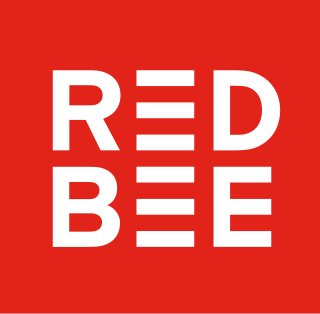Related Research Articles

Dubbing is a post-production process used in filmmaking and video production, often in concert with sound design, in which additional or supplementary recordings (doubles) are lip-synced and "mixed" with original production sound to create the finished soundtrack.

Closed captioning (CC) and subtitling are both processes of displaying text on a television, video screen, or other visual display to provide additional or interpretive information. Both are typically used as a transcription of the audio portion of a program as it occurs, sometimes including descriptions of non-speech elements. Other uses have included providing a textual alternative language translation of a presentation's primary audio language that is usually burned-in to the video and unselectable.

S4C is a Welsh language free-to-air public broadcast television channel. Launched on 1 November 1982, it was the first television channel to be aimed specifically at a Welsh-speaking audience. S4C's headquarters are based in Carmarthen, at the University of Wales Trinity Saint David's creative and digital centre, Yr Egin. It also has regional offices in Caernarfon and Cardiff. As of 2022–23, S4C had an average of 118 employees. S4C is the fourth-oldest terrestrial television channel in Wales after BBC One, ITV and BBC Two.

TG4 is an Irish free-to-air public service television network. The channel launched on 31 October 1996 and is available online and through its on demand service TG4 Player in Ireland and beyond.
Audio description, (AD) also referred to as a video description, described video, or more precisely visual description, is a form of narration used to provide information surrounding key visual elements in a media work for the benefit of blind and visually impaired consumers. These narrations are typically placed during natural pauses in the audio, and sometimes overlap dialogue if deemed necessary. Occasionally when a film briefly has subtitled dialogue in a different language, such as Greedo's confrontation with Han Solo in the 1977 film Star Wars: A New Hope, the narrator will read out the dialogue in character.
Arte is a European public service channel dedicated to culture. It is made up of three separate companies: the Strasbourg-based European Economic Interest Grouping (EEIG) ARTE, plus two member companies acting as editorial and programme production centres, ARTE France in Paris and ARTE Deutschland in Baden-Baden.

Odex Pte. Ltd. is a Singapore-based company that licenses and releases anime for local and regional Southeast Asian consumption. Odex was established in 1987 and set up its Anime Distribution department in 2000, selling anime in Singapore. It works with Japanese licensors such as Sunrise Inc., TV Tokyo, Yomiuri TV, D-Rights, TMS, Showgate Inc and Aniplex Inc. Odex also sells programs to television stations in Singapore, Malaysia, Indonesia, such as TV3, NTV7, Astro, MediaCorp TV and StarHub TV. Other than licensing, Odex also does English dubbing, translation and subtitling for other companies. Odex also deals in anime merchandise sales.

MBC Group, formerly known as Middle East Broadcasting Center, is a Saudi state-owned media conglomerate based in the Middle East and North Africa region. Launched in London in 1991, the company moved to its headquarters to Dubai in 2002 then moved to Riyadh in 2022.

A pre-flight safety briefing is a detailed explanation given before take-off to airline passengers about the safety features of the aircraft they are aboard.

The Adventures of the Little Prince is an anime series based on the book by Antoine de Saint-Exupéry. Made by the animation studio Knack Productions, the series, originally titled The Prince of the Stars: Le Petit Prince, aired in Japan on the TV Asahi network from July 1978 to March 1979. Dubbed into English, the series premiered in the United States in 1985 on Nickelodeon and was rerun through June 1, 1985 to December 29, 1989. It was also broadcast on TVOntario throughout the 1980s beginning in 1985, a station that would later pick up the dub of the 2010 French adaptation. Yoshikazu Yasuhiko, of Mobile Suit Gundam fame, was involved in this series as a director.

Subtitles are text representing the contents of the audio in a film, television show, opera or other audiovisual media. Subtitles might provide a transcription or translation of spoken dialogue. Although naming conventions can vary, captions are subtitles that include written descriptions of other elements of the audio like music or sound effects. Captions are thus especially helpful to people who are deaf or hard-of-hearing. Subtitles may also add information that is not present in the audio. Localizing subtitles provide cultural context to viewers. For example, a subtitle could be used to explain to an audience unfamiliar with sake that it is a type of Japanese wine. Lastly, subtitles are sometimes used for humor, as in Annie Hall, where subtitles show the characters' inner thoughts, which contradict what they were saying in the audio.

SBS is a multicultural public TV network in Australia. Launched on 24 October 1980, it is the responsibility of SBS's television division, and is available nationally. In 2023, SBS had a 7.7% audience share.

PlayTV is an add-on unit for the PlayStation 3 video game console that allows it to act as a digital television receiver, and digital video recorder, using the DVB-T standard.

BBC Alba is a Scottish Gaelic-language free-to-air public broadcast television channel jointly owned by the BBC and MG Alba. The channel was launched on 19 September 2008 and is on-air for up to seven hours a day. The name Alba is the Scottish Gaelic name for Scotland. The station is unique in that it is the first channel to be delivered under a BBC licence by a partnership and was also the first multi-genre channel to come entirely from Scotland with almost all of its programmes made in Scotland.

Red Bee Media, formerly Ericsson Broadcast and Media Services (EBMS), is an international broadcasting and media services company and the largest access provider in Europe. Red Bee has its headquarters in London, England, with branch offices in Glasgow, Cardiff, MediaCityUK in Salford and Newcastle upon Tyne, and international offices in Australia, France, Spain, Germany, Finland, the Netherlands, Sweden, France, Canada, United States and Abu Dhabi. It has 2,500 employees worldwide across eight media hubs and distributes over 2.7 million hours of programming each year worldwide. It is a wholly owned subsidiary of Ericsson.
George Roubicek is an Austrian actor, and a dialogue director and script adaptor for English-language versions of foreign films and television shows. Born in Austria, Roubicek appeared in a number of small roles throughout the 1950s, '60s and '70s, including the films The Bedford Incident, Billion Dollar Brain and The Dirty Dozen. In 1967, he appeared in The Tomb of the Cybermen, a four-part Doctor Who serial. He played the part of Semenkin in The Champions. Roubicek had a small role in A New Hope, the first Star Wars film, as the Imperial Commander Praji. He also appeared in two James Bond films, You Only Live Twice and The Spy Who Loved Me.

Surtitles, also known as supertitles, SurCaps, OpTrans, are translated or transcribed lyrics/dialogue projected above a stage or displayed on a screen, commonly used in opera, theatre or other musical performances. The word "surtitle" comes from the French language sur, meaning "over" or "on", and the English language word "title", formed in a similar way to the related and similarly-named subtitles. The word Surtitle is a trademark of the Canadian Opera Company.
Multimedia translation, also sometimes referred to as Audiovisual translation, is a specialized branch of translation which deals with the transfer of multimodal and multimedial texts into another language and/or culture. and which implies the use of a multimedia electronic system in the translation or in the transmission process.
Amara, formerly known as Universal Subtitles, is a web-based non-profit project created by the Participatory Culture Foundation that hosts and allows user-subtitled video to be accessed and created. Users upload video through many major video hosting websites such as YouTube, Vimeo, and Ustream to subtitle.
The European Association for Studies in Screen Translation (ESIST) is an international association in the field of audiovisual translation. According to ESIST, screen translation includes all forms of language transfer in the media, including subtitling, dubbing, voice-over, interpreting for the media, surtitling, subtitling for viewers who are deaf or hard of hearing, and audio description for blind and partially sighted audiences.
References
- ↑ "AirScript translator beams live theater subtitles over the air". 26 November 2009. Retrieved 25 April 2023.
- ↑ "London West End show goes multi-lingual". Archived from the original on 2010-04-16. Retrieved 26 November 2009.
- ↑ media_access (2010-11-22). "New subtitling device launched in British theatres". Media Access Australia. Retrieved 2023-04-25.
- ↑ media_access (2010-11-22). "New subtitling device launched in British theatres". Media Access Australia. Retrieved 2023-04-25.